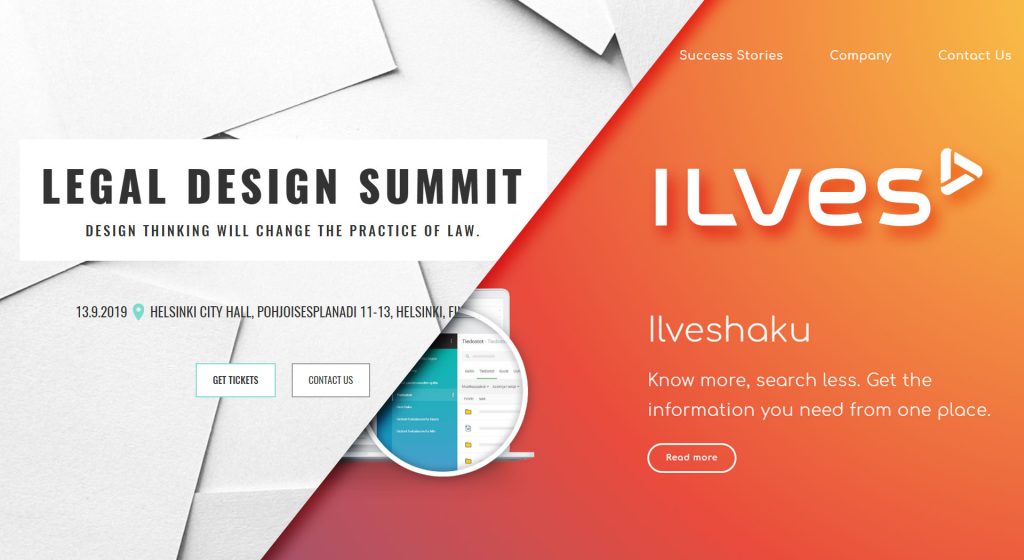ILVES – Data, design & daily work

The Legal Design Summit 2019 will take place from 10–13 September 2019 in Helsinki. The summit brings together over 500 international experts and forerunners in the fields of LAW, DESIGN, AND DIGITAL SERVICES. Read more about the event www.legaldesignsummit.com.
We are delighted to have the opportunity to sponsor the Legal Design Summit and Brain Factory. It is a significant opportunity to share our insights on data & design and learn from the international participants of the Brain Factory.
Read our challenge below:
1. Background
The legal market is moving from a relationship-based to a buyer-centric and data-driven one. The legal profession has the challenge of learning which data can add business value, and drive efficiency to meet their clients’ (internal/external) ‘more for less’ demands. Hype surrounding technology has led many into tech biased thinking: “technology alone will increase profitability”.
However, creating more value for less effort and staff time requires new ways of engaging people within legal teams and new ways of working to drive change within a busy legal organization. Reducing the technology bias and developing a human centric approach that focuses on creating client value takes time and requires developing new skills.
The future of our everyday work plays a big role in this. The list of everyday universal “have-to-do” tasks is long. These – often micro tasks – take time and don’t often bring direct value for the client and fail to build on organizational data. There are many technological solutions that try to tackle this problem, but fail to change the way lawyers work. At the same time, the nature of work is changing from individuals to teamwork. This will also have an effect on the execution of small and bigger everyday tasks.
To take a step forward in creating meaningful organizational change (that brings value for the client), we should help lawyers execute these tasks faster, while and improving outcomes and client experience. We believe that combining designerly skills, methods and mindsets with the innovative use of organizational data, could benefit lawyers’ work and create more value for their clients.
2. Design challenge
Redesign lawyers’ legal every-day work process, that is inspired by designerly methods and innovative use of organizational data.
- What are the universal (especially micro) legal creation tasks in a lawyers’ everyday work?
- Which of these tasks prevent faster and better quality service and hinder good user/client experience?
- Which of these are easy to redesign with a single-point access to organizational information and knowledge? (Often most value is created in tasks, where a lawyer has to jump from one place to another to find the information needed.)
- In which of these tasks designerly-tools or mindset could create added value (e.g. better quality, faster service or better user experience) for the business?
- Which designerly tools and methods would help lwyers become more data savvy? Are there some specific design methods that could help?
You can redesign single tasks, combine existing ones, replace them with better ones or invent a totally new way of doing things by utilizing organizational data and design tools. The Brainfactory outcomes should help lawyers be more efficient, provide better quality outcomes and better user experience.
Lawyers can learn how they can become more data savvy. They might get a toolbox to jump start their design journey or have an easy to understand list of ‘low hanging fruit’ legal tasks to be able to engage people within their organization and get them to join the ‘data & design’ journey.
Scope: Focus on the legal process. Assume that all relevant organizational information and knowledge is already available from one place. Business processes will not be included in the scope this time.
3. Network
- In the context of this challenge, it’s assumed that a lawyer has no prior design knowledge or experience.
- Both the client (business owner) and lawyer want to add value to their business: the less time spent, the better the results and the more satisfied the client is, the more profit both companies will make.
- You can take either an in-house legal service or a legal agency perspective. However, this may not be necessary as the legal tasks are often the same.
4. About Ilves Solutions
Ilves is an established and innovative family business founded in 2011. We make data valuable. Ilves is comprised of three companies: Ilves Solutions Ltd, Ilves Valmisohjelmistot Oy and Ilves Invest Ltd.
We believe that it’s our job to make the data behind technology valuable by narrowing the gap between data and the future of everyday legal work. This is the reason why we will launch a strategic (legal) design tool for lawyers. We hope that it will help legal organizations to maximize value creation for their clients and increase their own profitability by utilizing organizational data.
Our new Search Cost Calculator is a MVP of the new tool. It helps to estimate how much staff time can be saved from search tasks (by using a single point of access to organizational information) and used for more skilled work. The tool and our services
will be further developed based on the feedback and insights gathered from the Brain Factory workshops.
Harnessing the value of data is the key when creating a data centric and self-steering organizational culture and the future legal workplace. This is no straightforward task. We at Ilves believe that gathering data into one easily accessible place is the starting point for all enterprises when building a competitive edge. Bringing valuable information transparently into one place is a challenge that Ilves Solution has already solved.


